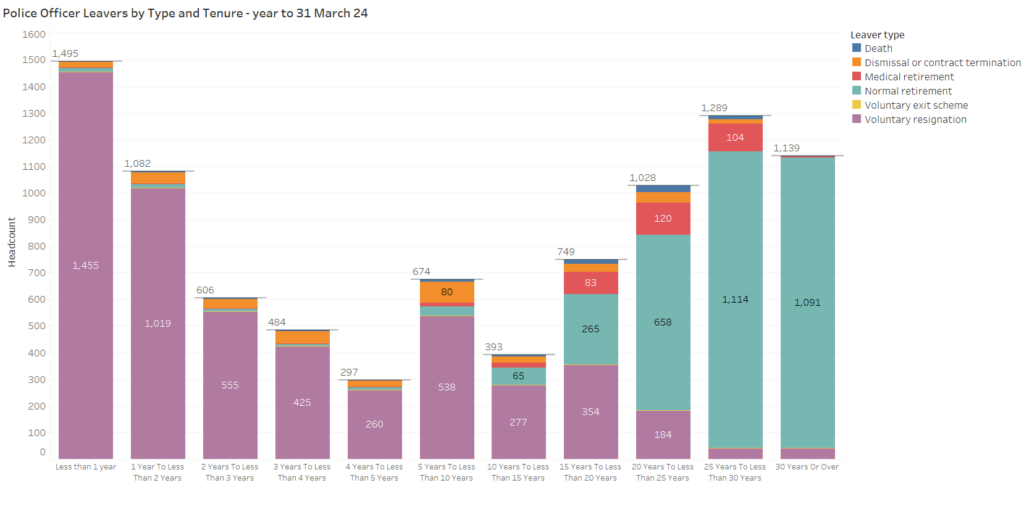;)
As we enter 2025, there is perhaps no area that better highlights the complexities of modern UK policing than workforce planning. Over recent years, police forces across England and Wales have undergone extensive recruitment campaigns, spurred by political pressure to meet ambitious officer numbers. While these efforts have brought thousands of new recruits into policing, they have also exposed critical challenges in recruitment, retention, and long-term planning.
1 – Recruitment Challenges: A Shrinking Talent Pool
The government’s Uplift programme, which sought to recruit 20,000 additional officers, initially brought an influx of new talent into policing. However, workforce planners report increasing difficulties in finding sufficiently qualified candidates. Potential recruits are often deterred by factors such as negative public perceptions of policing, competitive job markets, or dissatisfaction with pay and conditions compared to other sectors.
Specialist roles face even greater recruitment challenges. Positions such as detectives and firearms officers require advanced skills and experience, making them harder to fill. For instance, cybercrime specialists need expertise in digital forensics and information security—skills that are highly sought after in the private sector. The relentless focus on hitting recruitment targets has sometimes overshadowed the need for diversity and specific expertise, leaving gaps in the workforce’s ability to address modern crime trends like online fraud and complex safeguarding cases.
2 – Retention Woes: Losing Talent Too Soon
Retention is an increasingly pressing issue for police forces – Last year leavers equated to 6.2% of Headcount, with 3 Forces seeing more than 8% leave (West Midlands, Thames Valley and Suffolk). Many officers who joined during the Uplift programme have already left, citing unmet expectations, dissatisfaction with the job, or work-life balance issues. Some recruits view policing as a stepping stone, moving on once they’ve earned their degree or gained initial experience. These high attrition rates are costly and destabilising, undermining the consistency and cohesion required for effective policing.

Retention challenges are exacerbated by the lack of clear career progression pathways. Specialist roles often demand additional qualifications and years of service, yet many officers feel unsupported in reaching these milestones. Addressing this requires targeted efforts, such as mentorship programmes, streamlined training pathways, and greater flexibility in how officers can pursue specialist careers. Without visible opportunities for advancement, forces risk losing motivated officers to other sectors, leaving critical gaps in skills and experience.
3 – The Impact of Retirement
Retirement is another significant challenge. Officers frequently leave the service after reaching the 30-year mark or retiring on age grounds. Financial constraints often exacerbate this issue, as finance teams delay replacement hiring until officers officially retire, leaving prolonged vacancies in critical areas such as firearms units. These delays place additional strain on remaining officers and disrupt service delivery.
Retiring officers often take with them decades of institutional knowledge and expertise. For specialist units, these losses are particularly damaging, as rebuilding capability and training replacements takes time. Forces should look to prioritise knowledge transfer programmes and succession planning to ensure a smooth transition between outgoing and incoming staff, maintaining operational effectiveness.
4 – Data Deficiencies: A Barrier to Planning
Effective workforce planning depends on accurate and accessible data, yet many police forces struggle with outdated systems and fragmented information. Resourcing and skills data is often scattered across central systems and departmental spreadsheets, making it difficult to form a comprehensive picture of workforce needs.
Addressing these deficiencies requires investment in modern workforce management systems that integrate data across departments and provide real-time insights. Predictive analytics could help forecast retirements, identify skills gaps, and allocate resources effectively. Forces that adopt these technologies can transition from reactive to proactive workforce planning, ensuring they are prepared for emerging challenges like cybercrime and evolving community needs.
5- Declining Experience Levels
Over the past decade, policing has seen a significant decline in overall experience levels. A wave of retirements and high attrition rates among mid-career officers has created a workforce dominated by new recruits. While these recruits bring fresh energy, they require extensive training and mentorship to reach full competency.
The imbalance between experienced and inexperienced officers creates vulnerabilities, particularly in high-stakes areas like public protection or organised crime. Forces must retain mid-career officers by improving support structures, offering competitive pay, and fostering a culture of recognition. Simultaneously, accelerated development programmes for new recruits can help bridge the skills gap more effectively.
The Path Forward: Strategic Workforce Planning
To address these challenges, police forces can embrace strategic workforce planning. Rather than reacting to immediate pressures, a structured approach to building a resilient and capable workforce is required. This includes:
- Forecasting future needs: Anticipating retirements, attrition, and shifts in demand to align recruitment and training efforts accordingly.
- Enhancing data quality: Investing in modern systems that provide real-time insights into workforce metrics, enabling better decision-making.
- Creating career pathways: Developing clear progression routes for officers to move into specialist or leadership roles, fostering long-term engagement.
- Focusing on retention: Prioritising initiatives that support officer wellbeing, career development, and job satisfaction.
Conclusion
Workforce planning is a critical challenge for UK policing, but it is also an opportunity for transformation. By addressing recruitment, retention, and data issues, police forces can build a more sustainable and effective workforce. Linking workforce planning directly to operational outcomes—such as improved community engagement and response times—will strengthen public trust and confidence.
Policing is at a crossroads. By prioritising long-term planning and investing in their people, forces can create a stronger foundation for the future—one that serves both officers and the communities they protect.
For more insights and updates, stay connected with our ongoing conversations at www.processevolution.co.uk or reach out to us via email at info@processevolution.co.uk
Written by Ali Motion – Principal Consultant